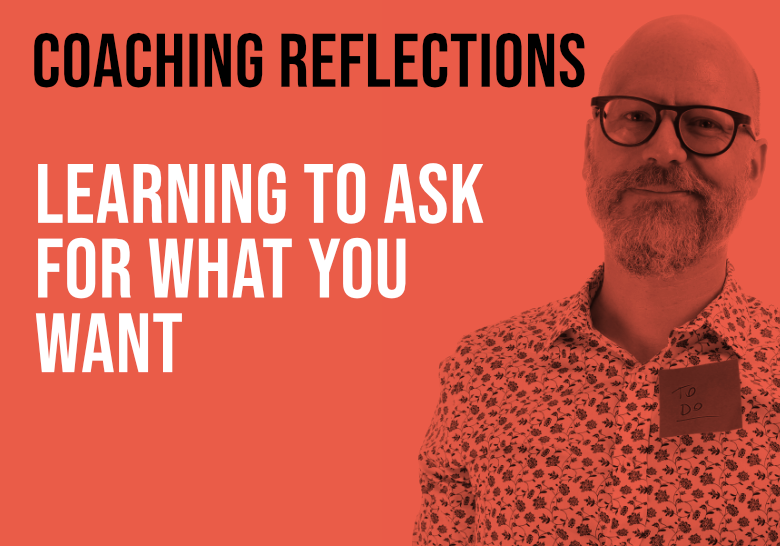When we using indirect, hedging language and people please, we can actually end up being selfish by accident, because we’re asking them to do the emotional lifting to decipher our request.
The topic of this week’s Coaching Reflections video is learning to ask for what you want in direct language without being rude. It is definitely something you can practice and it also builds your confidence.
Transcript
Intro
[00:00:00] Andy Polaine: Why is asking for what you want so difficult and why might something that feels like where people pleasing actually turn out to be selfish?
Every week I spend my days coaching design leaders. And in these videos, I reflect upon the common themes and questions that come up in the week. And this week, I want to talk about this idea of people pleasing and using hedging language.
Hedging Language
[00:00:19] Andy Polaine: By hedging language. I mean the language we use to soften a request or something we want to say. So instead of saying, I would like X. You’re saying do you think it would be okay if I could just have X for a little bit of time?
Maybe you seen examples in your family or your social or work life as you’ve been growing up that are abrasive and you have a bit of a reaction to that and think I don’t want to be like that.
People Pleasing
[00:00:39] Andy Polaine: This can very quickly turn into a people pleasing complex. Where all you’re doing all the time is wanting to make sure that people like you.
And that can mean you’re inadvertently reinforcing the wrong behavior. So you’ve asked for something, maybe at work you’ve asked for something to be done in a certain way, but you’ve asked it in language that makes it sound like it’s optional and so the person has decided to do something else.
But the paradox is if you don’t actually ask for what you want and just hint at it. You’re actually making the other person do a lot of the emotional lifting to decipher what you’re asking for and try and read your mind.
They’re having to think, "Okay he, or she has said that thing, but what is it they really want? I think they maybe want this." And then of course they might get it wrong. And then you’re annoyed and then it’s their fault.
So that’s how that actually turns out to be selfish by accident.
Know Your Filler Words
[00:01:23] Andy Polaine: So, what can you do? Well, I want to emphasize to start with it, that this doesn’t mean being blunt or gruff or being rude. It just means being more direct and honest. And that’s using clearer language sometimes and avoiding your filler phrases and words. For example, a lot of mine are things like right, you know, like.
Some of those are going to creep into your natural language.
Practice asking for what you want
[00:01:43] Andy Polaine: You can practice asking for what you want with people you trust. So that might be your partner. That might be some other relatives or friends. And you can name it to yourself when you catch yourself doing it, or you can even name it to them. So when you catch yourself saying things like, "Well, you know, I’ll have whatever you’re having or so I’m thinking maybe what would be good would be…"
You can stop and say, "Hang on. I’m trying to get better at asking for what I want. Here’s what I want."
So when you do this among people you trust and more likely in your personal life, you break the pattern and the habit. You show a vulnerability to that person and you invite them to help you grow. And then you get to try it again.
So now the emotional lifting you’re asking that person to do is very direct. You’re saying help me get better at this, rather than please decode this for me whilst I just sit back.
So you can try out in a low stakes environment to start with asking for what you want to eat or drink or saying something that you don’t want or don’t like.
In work context, eventually, it could be asking for a raise or a promotion, or it could be giving direction at work where you really need to be clear about the fact this isn’t an optional thing. This is a thing that has to be done.
Treat it as a form of curious inquiry and just play with it. It’s just like any other creative process. You explore the affordances of the different kinds of materials, the different phrases and words you might use. You reflect on how that feels and then you practice and you iterate it and play with it.
And I think you will find as you start to practice it more, you start to gain confidence in it and you start to feel more confident in yourself and present more confidently.
Outro
[00:03:10] Andy Polaine: Hope that’s useful for you.
If you’d like to check out my coaching practice it is at polaine.com/coaching and I’ll put the link below.
If you’ve got any of your own tips, particularly asking for what you want, please post them below. I’d love to hear them.
Thanks very much. And I’ll see you again soon.


